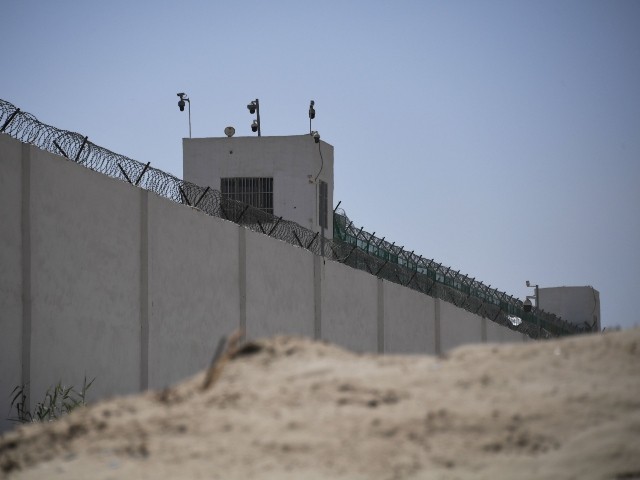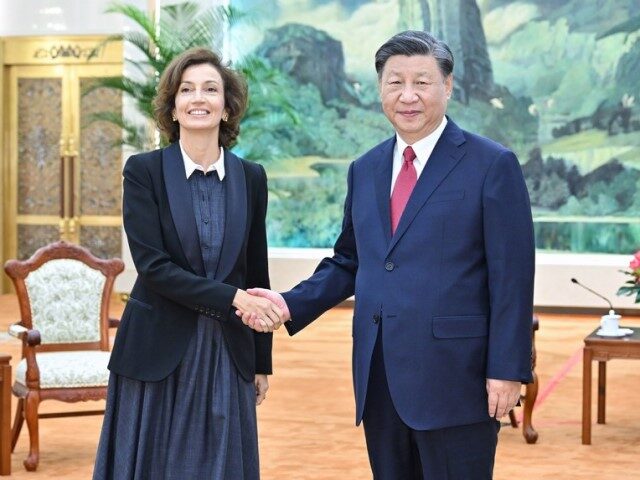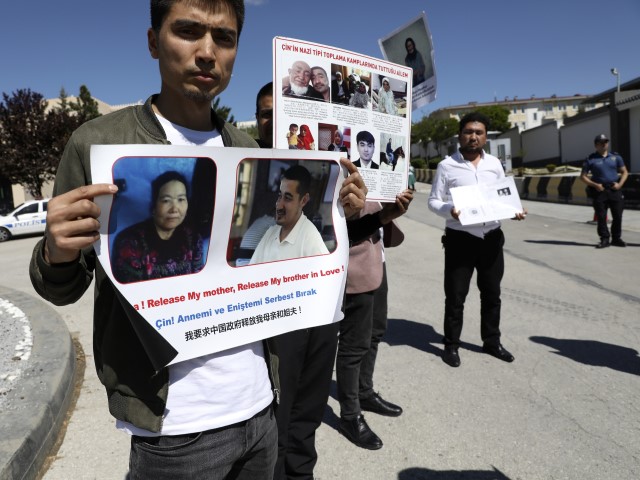Genocidal Chinese dictator Xi Jinping welcomed United Nations Educational, Scientific and Cultural Organization (UNESCO) Director-General Audrey Azoulay to Beijing on Thursday to discuss the Communist Party’s “positive contributions” to the world and expanding “heritage protection.”
Azoulay reportedly told Xi that her organization, which is dedicated to supporting “international cooperation in education, sciences, culture, communication and information,” is “satisfied” with China’s relationship with UNESCO and sought to expand “cooperation with China further in the fields of cultural heritage protection, science, culture and technology.”
The meeting, as detailed by the Chinese state-controlled Xinhua News Agency, was a friendly and productive one. Xinhua did not mention Azoulay challenging China regarding its ongoing genocide against indigenous Muslim groups in occupied East Turkistan, including the widespread destruction of historical and cultural sites, despite UNESCO’s responsibilities regarding cultural preservation.
Xi launched a campaign of genocide against the Uyghurs of occupied East Turkistan – which the Chinese Communist Party refers to by the Han colonialist name of “Xinjiang Uyghur Autonomous Region” – shortly after taking office as “president” in 2014. Leaked Chinese police documents published by the Victims of Communism Foundation in 2022 revealed that Xi was personally responsible for ordering his underlings to “break the lineages, break the roots, break the connections, break the origins” of Uyghurs, Kazakhs, Kyrgyz people, and other Turkic indigenous people in East Turkistan.
The most gruesome facet of the Uyghur genocide known to the public is the use of over 1,200 concentration camps to imprison 3 million people. Eyewitnesses and survivors have described a variety of tortures at the concentration camps including “pulling off fingernails; beating with sticks; detaining in ‘tiger chairs’ where feet and hands were locked in position for hours or days without break; confined in containers up to the neck in cold water; and detained in cages so small that standing or lying was impossible.” Survivors also endured gang rapes, forced sterilization, slavery, and medical testing consistent with live organ harvesting.

This photo taken on May 31, 2019, shows the outer wall of a complex which includes what is believed to be a “re-education camp” where mostly Muslim ethnic minorities are detained, on the outskirts of Hotan, in China’s northwestern Xinjiang region. (GREG BAKER/AFP via Getty Images)
Xi’s regime has also systematically targeted centuries-old mosques, cemeteries, and other historical sites of cultural significance to the Uyghur people, demolishing them and replacing them with communist administration buildings, empty fields, and toilets.
Xi used his meeting with Azoulay, according to Xinhua, to assure the UNESCO chief that his government remained interested in playing a major role in the work of the organization.
“China is willing to work more closely with UNESCO to continuously improve the capacity for and level of heritage protection, and promote exchanges, mutual learning and cooperation among different civilizations,” Xi reportedly said, “in order to contribute to world peace and facilitate the building of a community with a shared future for humanity.”
Azoulay appeared to accept Xi’s promises and credited China with helping establish “the UNESCO Prize for Girls’ and Women’s Education” – notably omitting references to the gang rapes and forced sterilizations of women and girls in East Turkistan.
“Azoulay said that UNESCO is satisfied with its important consensus and cooperation with China in a wide range of fields, and hopes to strengthen exchanges and cooperation with China further,” Xinhua reported, “in the fields of cultural heritage protection, science, culture and technology to achieve further international consensus and contribute to safeguarding world peace and development.”
In anticipation of Azoulay’s visit to Beijing, the head of the UNESCO Beijing office, Shahbaz Khan, effusively praised the Communist Party in an interview on Thursday with CGTN, a Chinese government broadcaster.
“More than the number of [UNESCO Cultural Heritage] sites, I strongly believe China’s desire to help other countries to link with other countries to give room for their culture and tradition and to give room for their development, I think, it’s more beautiful than just the number of sites,” Khan gushed.
“President Xi Jinping’s desire to have more multilateralism and better understanding of civilizations,” he continued, “this is a continuum of saying to the world, ‘we need to take account, show respect, understand different cultures and have a mutual understanding as humans on this planet Earth.”
Xi is a particularly ill-suited partner for cooperation with UNESCO on the mission to “take account, show respect, [and] understand different cultures.” In East Turkistan, Xi especially targeted for destruction the region’s historic mosques and cemeteries, which are of particular value to Uyghur communities as they serve as a physical history of notable local figures. As of 2020, the Australian Strategic Policy Institute (ASPI) documented the Communist Party destroying or materially damaging 16,000 mosques in the region.
“An estimated 8,500 have been demolished outright, and, for the most part, the land on which those razed mosques once sat remains vacant,” the ASPI noted at the time. “A further 30 percent of important Islamic sacred sites (shrines, cemeteries and pilgrimage routes, including many protected under Chinese law) have been demolished across Xinjiang, mostly since 2017, and an additional 28 percent have been damaged or altered in some way.”
While most demolished former mosques and cemeteries were then empty lots, in one particularly egregious incident, the Communist Party erected a public toilet over the site of a demolished mosque in Atush, East Turkistan. A local official told Radio Free Asia (RFA) at the time that “Han comrades” had the idea, but he did not know of any need for more public toilets in the area.
A year prior to the publication of that report, Chinese officials described the campaign to eradicate the presence of Uyghur cemeteries as necessary to make communities more “civilized.”


COMMENTS
Please let us know if you're having issues with commenting.